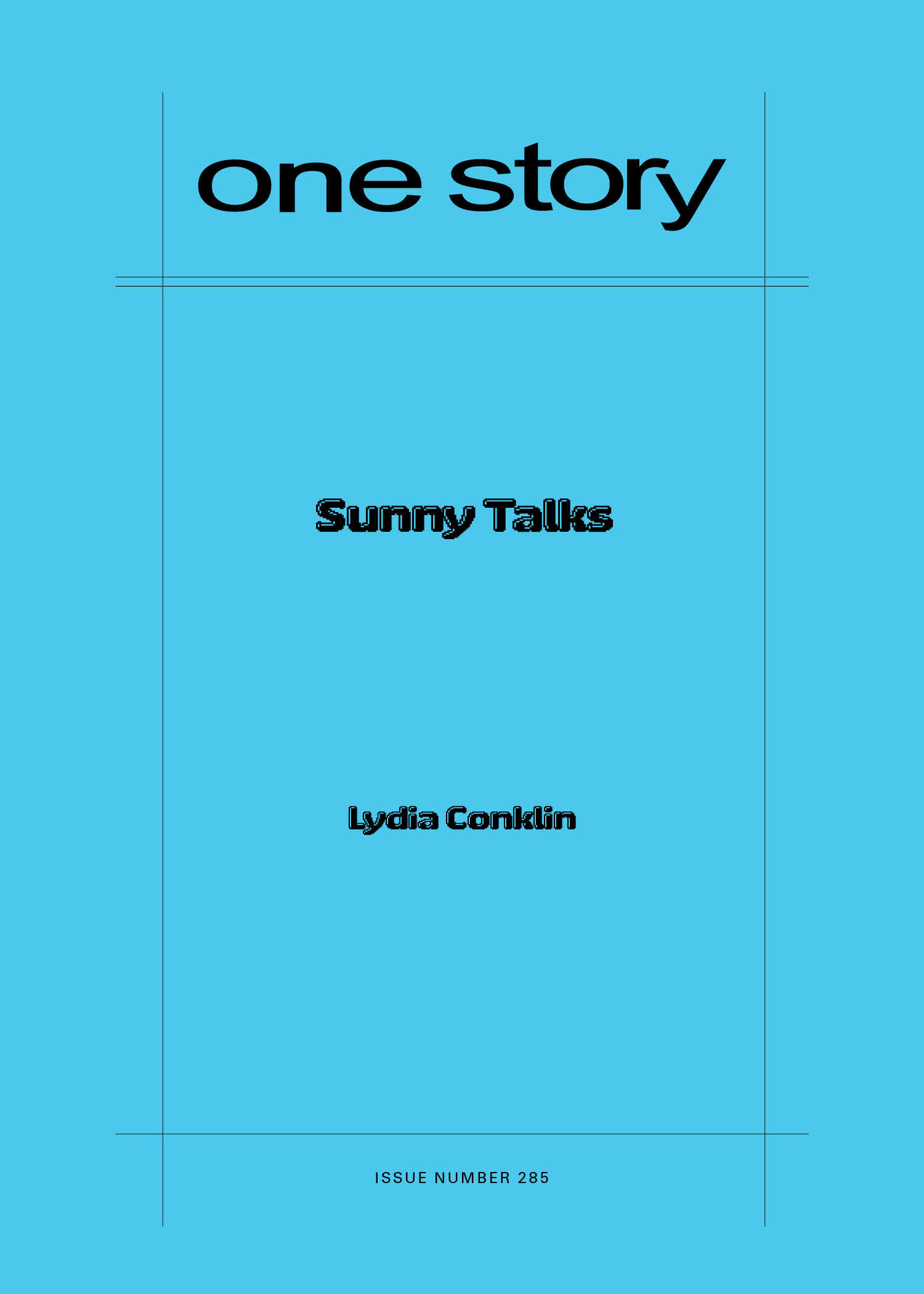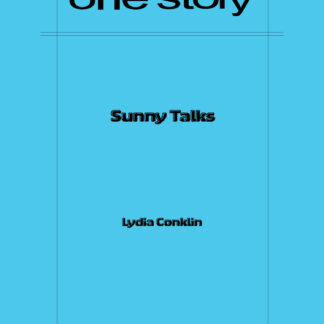
Sunny Talks
$2.50
242 in stock
Excerpt
Hunched over my computer in my cubicle, I prepare for my nephew’s visit by watching one of his YouTube videos. His backdrop is his bedroom, the walls painted black, centaur and mermaid posters freshly hung. His mascots, he calls them. He pops into the frame, flaunting his naked, scar-free chest. He’s fifteen but looks ten. His wrists are so frail, his shoulders so narrow, that I worry he’ll break his arms with his eager, sweeping gestures. His audience is ten or twenty thousand people who litter his page with rainbow emojis, kissing emojis, and shining sun emojis that are occasionally interrupted by trolls reminding him he’s a damaged and mutilated female.
“Welcome to Sunny’s channel.” He rolls his eyes like everyone knows already. Sunny was always his name, so when people threaten to publish his real name, he has a laugh, thrusting his head back against the wall of his bedroom, which is beside my older sister’s room in their little house in Shrewsbury, though Sunny doesn’t reveal where he dispatches from; he’s learned from millennial elders on the platform at least the basics of safe internet practices.
Lydia Conklin
Lydia Conklin is the Helen Zell Visiting Professor in Fiction at the University of Michigan. They’ve received a Stegner Fellowship, a Rona Jaffe Foundation Writer’s Award, three Pushcart Prizes, a Creative Writing Fulbright in Poland, a grant from the Elizabeth George Foundation, a Creative Writing Fellowship from Emory University, work-study and tuition scholarships from Bread Loaf, and fellowships from MacDowell, Yaddo, Hedgebrook, Djerassi, the James Merrill House, and elsewhere. Their fiction has appeared in Tin House, American Short Fiction, The Southern Review, and The Paris Review. They have drawn cartoons for The New Yorker and Narrative Magazine, and graphic fiction for The Believer, Lenny Letter, Popula Magazine, and the Steppenwolf Theater in Chicago. “Sunny Talks” is from their story collection, Rainbow Rainbow, which will be published in May 2022 by Catapult in North America and Scribner in the UK.
Will Allison on “Sunny Talks”
In Lydia Conklin’s extraordinary new story “Sunny Talks,” the world knows forty-seven-year-old Lillia as a frumpy, asexual, boyish woman, but in truth, Lillia is nonbinary, inhabiting a middle ground between the genders—a secret they’ve been keeping all their life. The problem is, Lillia doesn’t want it to be a secret, but they’ve never worked up the courage to come out to anyone.
Enter Sunny, Lillia’s exuberant fifteen-year-old nephew. Sunny is also gender non-conforming—a trans boy—and when he invites Lillia to a Philadelphia convention for trans YouTubers, Lillia intends to finally tell him the truth.
But things don’t work out quite as planned. While finding inspiration in the Gen Z kids at the conference, Lillia is also pained by a generational divide. Lillia grew up at a time when you were more or less stuck with the gender you were assigned, whereas Sunny and his peers came along in an era when early medical intervention was an option. In Lillia’s childhood, to be gender non-conforming was to be ostracized, whereas Sunny and his friends celebrate their gender identities with thousands of YouTube followers.
“I’m glad Sunny got hormone blockers,” Lillia says, “[and] I’m proud of my sister for realizing what was going on, for getting him to a specialist before puberty started…[but] sometimes I can’t bear the fact that, if I were born a bit later, all I would’ve needed was injections. That my body never had to bloom into these curves.”
I’ve been an admirer of Lydia Conklin’s work for years, but “Sunny Talks” might be their warmest, most heartfelt story yet. If you enjoy it as much as I hope you will, please keep an eye out for Lydia’s first book, the story collection Rainbow Rainbow, due out in May from Catapult.
Q&A by Will Allison
- WA: What was the seed of this story? What was the first thing you wrote?
- LC: I have two trans niblings, neither of whom are Sunny, but people always find it strange that there are three trans people in one family (three wasn’t believable enough for a story). I’m eternally impressed with how much younger than I my niblings were when they acted in courage around their gender, and when I was taking steps, finally, I turned to Gen Z vloggers to light the way. I found it funny to be seeking the wisdom of people fifteen years younger, but why not? They knew a lot more than I did. In general I’m in awe of Gen Z. I’m not saying it’s easy now, at all, but there was only one out student among 1,600 kids at my high school, and this in a liberal town. To be trans would’ve been an abomination. So the generational divide was where I started.
- WA: What was the most challenging aspect of writing this story?
- LC: There were a lot of most difficult parts! Two of the hardest were the ending and certain aspects of Lillia’s character. I workshopped this story in Adam Johnson’s workshop in the Stegner Fellowship, and he and my cohort were so insanely helpful. They kept pushing me about the end—Minsie’s speech kept evolving and changing; I would write it and rewrite it and take it away. The very ending had to be about Sunny but also Lillia, and had to gesture toward the future. My genius editor, Leigh Newman at Catapult, pushed me further and further on the ending, drawing it out, making it sadder, leading me toward Minsie’s offer and the dissolving of the promise. You and Patrick at One Story pushed me to draw it out even further. That was the aspect of the story that took longest to resolve. Lillia’s character was a struggle in that their conflict is very interior, but early drafts indulged a lot of self-pity, and my cohort was firm with me about that, and I always listen to them!
- WA: “Sunny Talks” is told from the perspective of Sunny’s aunt Lillia, who longs to tell their nephew that they’re nonbinary. I love the disarming honesty and vulnerability of their voice. How did you settle on first-person narration?
- LC: To be honest, I was struggling with the third-person narration of my novel, which I was writing at the same time. Everyone kept harping on me to change it to first person (the answer is NO! I guess I don’t always listen). But I always remember what Lorrie Moore said once in workshop, that it’s a myth that you can get closer to character with first person; you can get just as close with third if you do it right. At that stage of my novel, I was not doing it right, so writing a story in first person felt very appealing.
- WA: I also love the scene in the parking lot where Lillia is sort of flirting with the keynote speaker, Minsie, and then Sunny butts in, eventually leading Lillia to open up about being nonbinary. Did you always know how that scene would unfold, or did you discover it as you were writing?
- LC: No, I didn’t at all. In earlier drafts, Minsie was more of a wise person, an example of someone who’d figured it all out and was dispensing wisdom from a comfortable seat on the other side. But that wasn’t the most interesting choice—it was a little bit of a flat dynamic. I’m always trying to see what’s the most surprising and difficult yet emotionally honest decision that I can make at any given turn.
- WA: It’s hard for me to imagine anyone reading this story and not coming away with more compassion for transgender and nonbinary folks, but of course we live in a world where a lot of people lack that compassion and seek to deny LGBTQ folks their rights. Was the political climate at all on your mind when you were writing this story?
- LC: Definitely, especially how it has evolved since I was a kid. I think often about how different my choices would’ve been had I been a kid now, how, by being pushed into the wrong gender early, I actually came to identify with it in certain odd and reluctant ways, because all of my experiences were so tied to being perceived as female. That arc forced me into a middle-of-the-road position, gender-wise, like Lillia. And Lillia probably would’ve been more like Sunny if she had been born when he was.
- WA: “Sunny Talks” will appear in your first book, Rainbow Rainbow, due out in May. How does this story fit in with the rest of the collection?
- LC: “Sunny Talks” serves as a counterpoint to the stories that are based on my experience being trans and queer as a child, and how I was wrestling with that at the time. Sunny offers an example of how things might be different now—the new and different struggles to navigate, all the progress and backtracking. There’s another story in the collection that dramatizes an encounter between an older queer person and a young queer person, but that story is aligned with the young person’s perspective, and ends with much bleaker results, so “Sunny Talks” is a companion to that story also. Additionally, all of the trans characters in the book have liminal or uncertain identities. No one is plowing ahead on a well-trodden path, and, in that way, Lillia fits right in with the others.
- WA: How long did it take you to complete this story?
- LC: I started the story in the fall of 2019, and I just finished it now, so a bit over two years, though I was working on many other stories and novel projects alongside it. Often it takes me several years to finish a short story, and I have to keep cycling back to see it as alien again and allow myself to be brutal, so this one was a short tenure. I was thinking about the idea for a year or so before I wrote it, because I knew that I’d be expected to return to producing short stories in workshop, though, at first, all I had in mind was this one moment in the hospital with my nibling. Nothing like that moment ever even made it into the story.
- WA: What are you working on now?
- LC: I’m working on a novel called Songs of No Provenance about a folk singer who’s built her career on queer-baiting, who has acted badly out of professional jealousy, and begins a quest to untangle the toxic emotions of jealousy and fame hunger from what is real and good about making art.
- WA: What is the best bit of advice about writing you have ever received?
- LC: I’m always thinking about how Elizabeth Tallent encourages writers to take scenes further, to extend them out and keep the players talking, to see what odd and surprising places you can get to. You might end up cutting the majority of the dialogue, but where you end up will be different than the first draft. Remembering this advice also helps me to remember that every scene is its own whole weird world, and that I should sink deeply into every scene and not hurry along for the sake of plot.
